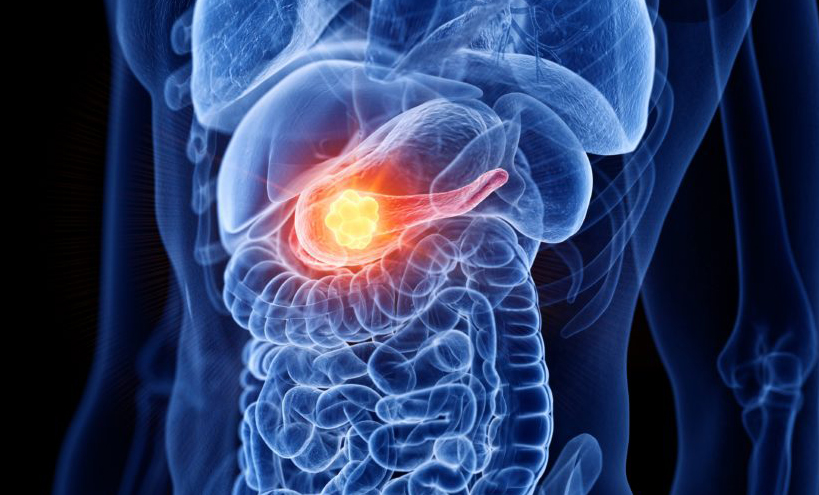Scientists in Scott Lowe’s lab at the Sloan Kettering Institute report that they are trying to zero in on the earliest stages of pancreatic cancer development.
“If we understood how these tumors form, maybe we could catch them before the cancer has progressed to an incurable stage,” says Direna Alonso Curbelo, PhD, a postdoctoral fellow in the Lowe lab who is the first author of a new paper “A gene–environment-induced epigenetic program initiates tumorigenesis” published in Nature.
Using advanced genomic techniques and innovative mouse models, the researchers were able to discern how tissue damage synergizes with specific genetic changes to promote the earliest stages of pancreatic cancer.
“Tissue damage increases the risk of cancer through poorly understood mechanisms. In mouse models of pancreatic cancer, pancreatitis associated with tissue injury collaborates with activating mutations in the Kras oncogene to markedly accelerate the formation of early neoplastic lesions and, ultimately, adenocarcinoma,” write the investigators.
“Here, by integrating genomics, single-cell chromatin assays and spatiotemporally controlled functional perturbations in autochthonous mouse models, we show that the combination of Kras mutation and tissue damage promotes a unique chromatin state in the pancreatic epithelium that distinguishes neoplastic transformation from normal regeneration and is selected for throughout malignant evolution. This cancer-associated epigenetic state emerges within 48 hours of pancreatic injury, and involves an ‘acinar-to-neoplasia’ chromatin switch that contributes to the early dysregulation of genes that define human pancreatic cancer.”
“Among the factors that are most rapidly activated after tissue damage in the pre-malignant pancreatic epithelium is the alarmin cytokine interleukin 33, which recapitulates the effects of injury in cooperating with mutant Kras to unleash the epigenetic remodeling program of early neoplasia and neoplastic transformation.”
“Collectively, our study demonstrates how gene–environment interactions can rapidly produce gene-regulatory programs that dictate early neoplastic commitment, and provides a molecular framework for understanding the interplay between genetic and environmental cues in the initiation of cancer.”
Early-stage cancer starts with the activation of a normal repair process in response to damage that can be inflicted by the pancreas’s own digestive enzymes.
“The pancreas is like a mini factory of enzymes made to break down food,” Alonso Curbelo says. “If these enzymes are released out of place, they can degrade the tissue and cause pancreatitis.”
The pancreas can repair itself. During the repair response, the cells in the damaged area change their behavior. They temporarily shut down their production of digestive enzymes and take on a different form. They return to their normal functioning once the damage has been resolved. At least, that’s what’s supposed to happen.
But when these damaged cells also contain a genetic mutation in a gene (KRAS), the wound-healing response goes haywire and the cells never return to normal. Mutant KRAS is known to drive tumor growth in 95 percent of people with pancreatic cancer, but it has so far been unclear how mutant KRAS derails the wound-healing process to initiate the disease.
Alonso Curbelo and colleagues were able to identify what distinguishes the normal repair process from the cancer-initiating one at the molecular level. They found major changes in how chromatin is organized that were uniquely induced in damaged KRAS-mutant cells. As a result of these changes, different genes are turned on and off, and the cells take on early cancerous properties.
The process can be compared to opening and closing a zip file. Parts of a chromosome that should be open for normal pancreatic function are inadvertently zipped. Conversely, other parts that are usually zipped are opened. As a result, the wrong set of genetic instructions is available to the damaged cell, which gets confused about its identity.
The whole process happens quickly. Researchers found that over half of the chromatin changes that typically characterize advanced pancreatic cancer were already present in these cells within 48 hours of tissue damage. Because these cancer-associated changes in gene expression are not caused by changes in DNA sequence, they are epigenetic.
This discovery is important because it suggests that scientists could potentially block cancer development by interfering with the activation of genes that become inappropriately turned on. And indeed, the team showed that they could do just that: When they prevented their activation in the damaged cells in the mice, the initiation of pancreatic cancer was blunted.
These early, cancer-associated epigenetic changes did not occur when either mutant KRAS or tissue damage were present separately. Only the combination triggered it.
“Our study provides some understanding of why cancers often arise at sites of tissue damage,” Scott Lowe says. “You need both a mutated gene and tissue damage to activate the epigenetic program that drives cancer initiation. Each alone does not do it.”
The discovery of epigenetic changes at the heart of cancer initiation, and their high degree of specificity, opens up the possibility that scientists could try to target these newly turned-on genes as a way to selectively interrupt cancer development.
Scientists also might one day be able to use these genes as markers to identify early signs of cancer and intervene before it’s too late.


